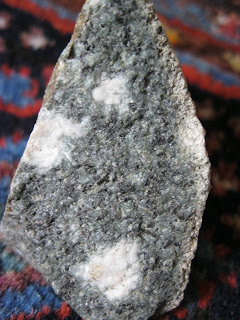
the slayer
Canto I, begins:
Here be dragons of the head's uncharted territories
Committed to a hospital of terracotta bricks . . .
Canto 2, goes on to describe the nature of several of the dragons the poet found committed there:
. . . docile as flowerpots
The poet informs us that those whom society perceives as possessed of dragons, for example the drowned shouters of a seawater society, are to become docile through the therapeutic touch of electrodes.
Like Burroughs and Ginsberg with The Yage Letters or Ken Kesey with One Flew over the Cuckoo's Nest, Morrison is a sensitive poet equipped with relevant insider knowledge and consequently he is able to provide a deceptively innocent and/or brutal humour as he feels to be appropriate.
Without the humour we the readers can never hope to face, let alone understand the nature of the dragons; or God's failed experiments as the priest poet R S Thomas labelled society's mentally damaged victims; those most ill-equipped to hack it in our brave cruel world.
In Captive Dragon's the reader will meet every conceivable variety of dragon; ranging from soporific Cheshire Cats / and wing-clipped escapologists . . . to . . . dragons in psychic meltdown . . . supplementing their theraputic electrodes with a Smartie selection of downers: chloropromazine, benzadrine, desmethyltramdol, dihydrocodeine, and dopamine so that most dragons keep returning in screaming tumbrels of ambulances; and all of them ready for their next fix as in Canto XXXV,-
. . . repeat defenders
Of irrefragable fragilities, recrudescent delicacies,
Inconvenient sensitivities conveniently
Misperceived as subversive tendencies, heretical Celtic
Quirks that can't be timetabled to rational Angled targets;
Silent rioters of rogue psychologies scooped out
Of cryptic contexts; psychic jigsaw pieces, riddling
Puzzle-boxes carved with mottled trepidations,
Deep-grooved anxieties and tortoiseshell aversions
To shelved selves; undeliverable parcels nonetheless
By the time the reader arrives at this verse he will be long aware that
Dragon's hatch from shells
of fractured narratives, splinters
of disrupted lives . . .
and that they have their own language. It is called Dragonic. In Canto XII Morrison gives the reader an inkling of its many properties:
A clash of rambling syllables, verbs that burn rubber,
Adjective trips, permissible slips,spoonerisms,
Farm-yard grunts, oral tics; unpronounceable parlance -
If written, like Sanskrit, spidery, tortuous, horizontal,
Or vertical . . .
Twitching sign language of irregular grammar . . .
Thundery arguments muffled in shut bedrooms . . .
For 3 years the Mill View Residency (2008-2011) Poet-in-Residence Alan Morrison, a self-confessed neurotic Doubting Thomas, bravely persevered and struggled on. He devotes several cantos to what he calls Poetry's Opportunity.
Eager to seek something far more rewarding than basket cases put to weaving wicker baskets Morrison eventually succeeds through the medium of poetry, in a Finnegans Wake kind of way, with his neurotic bid to provide a suitable outlet for the subdued fire of his soporific students.
Morrison's book may prove to be one of the poetic wonders of modern psychiatric literature. It is one of the keys to the mysterious world of art brut*. It belongs on the shelf alongside the works of Freud and Jung.
"This is poetry appropriate for the mental health experience, regardless of our own histories and directions," says Nick McMaster of the Sussex Partnership NHS Foundation Trust.
And of course he is right, but that is merely to scratch the dragon's back. With Captive Dragons I think we have a prequel. A work of Joycean proportions may lurk somewhere over the near horizon. Something of it may already be here. It is surely coming.
_____
image:
photo taken by myself
at Venice Biennale 2011
- main pavilion
- artist unknown
*entering the term "art brut" in the blog search box will bring up an explanatory post relating to the pioneering work with the artists of Gugging.












